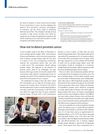 January 2021 in “ABC Heart Failure & Cardiomyopathy”
January 2021 in “ABC Heart Failure & Cardiomyopathy” When treating older patients with both heart valve disease and heart muscle disease, doctors should create personalized treatment plans that address both conditions.
 October 2020 in “Medicine - Programa De Formación Médica Continuada Acreditado”
October 2020 in “Medicine - Programa De Formación Médica Continuada Acreditado” Female hyperandrogenism is a condition caused by too much male hormones, leading to skin issues and ovulation problems, often due to Polycystic Ovary Syndrome, and is treated based on individual symptoms.
May 2017 in “Hair transplant forum international” Medical treatments can help manage frontal fibrosing alopecia, but hair transplantation should be done cautiously and only if the disease is inactive.
 January 2013 in “Revista brasileira de medicina”
January 2013 in “Revista brasileira de medicina” The study concluded that hair loss treatments should be tailored to the specific type of alopecia and individual patient needs.
 February 2007 in “Lancet Oncology”
February 2007 in “Lancet Oncology” Using a single PSA level to decide on a prostate biopsy is not effective; a more personalized approach considering various factors is recommended.
December 2022 in “Journal of dermatology and skin science” Androgenetic alopecia trials in the U.S. lack racial and ethnic diversity, limiting their applicability.
 237 citations,
January 2010 in “The Journal of Sexual Medicine”
237 citations,
January 2010 in “The Journal of Sexual Medicine” The report recommends personalized treatment for women's sexual dysfunctions and more research on effective therapies.
 49 citations,
January 2010 in “International Journal of Pediatric Endocrinology”
49 citations,
January 2010 in “International Journal of Pediatric Endocrinology” The document concludes that Nonclassic Congenital Adrenal Hyperplasia requires personalized treatment plans to manage symptoms and fertility, with glucocorticoids being a common therapy.
 3 citations,
January 2011 in “Female pelvic medicine & reconstructive surgery”
3 citations,
January 2011 in “Female pelvic medicine & reconstructive surgery” Hormones significantly affect women's sexual function, and more research is needed to improve treatments for sexual dysfunction with minimal side effects.
 3 citations,
February 1996 in “Dermatologic Surgery”
3 citations,
February 1996 in “Dermatologic Surgery” Walter P. Unger suggests using advanced hair transplant techniques for broader coverage, as they provide natural results and use donor tissue efficiently, while also recommending personalized planning due to the unpredictable progression of baldness.
 January 2018 in “Springer eBooks”
January 2018 in “Springer eBooks” Different races and genders have unique skin and hair issues, requiring specialized care and more research for effective treatment.
 January 2016 in “Archivio italiano di urologia, andrologia”
January 2016 in “Archivio italiano di urologia, andrologia” The document concludes that the risk of sexual side effects from 5-alpha-reductase inhibitors is low and often temporary, but more research is needed on potential permanent effects.

Eating less calories, focusing on complex carbs, and reducing fats can help manage type II diabetes.
 January 2018 in “Springer eBooks”
January 2018 in “Springer eBooks” Lasers are FDA-approved for permanent hair reduction, not removal, and more research is needed to improve treatments.
 22 citations,
August 2010 in “Annals of Plastic Surgery”
22 citations,
August 2010 in “Annals of Plastic Surgery” The study concluded that reconstructive surgery for burn alopecia should be tailored to the scar's size and quality, with different methods recommended for different cases.
 5 citations,
March 2019 in “Facial Plastic Surgery Clinics of North America”
5 citations,
March 2019 in “Facial Plastic Surgery Clinics of North America” The document concludes that gender-affirming treatments are essential for transgender individuals and outlines safe hormone therapy practices.
 2 citations,
June 2012 in “Journal of Cosmetic Dermatology”
2 citations,
June 2012 in “Journal of Cosmetic Dermatology” Hair transplant using beard hair made acne scars on cheeks less visible with minimal scarring in the donor area.
 2 citations,
March 2004 in “Reviews in Gynaecological Practice”
2 citations,
March 2004 in “Reviews in Gynaecological Practice” Hormonal changes and psychological issues can cause sexual dysfunction in postmenopausal women. Behavioral therapy is recommended first, with hormone replacement helping some symptoms but not libido. Testosterone can improve libido, but its effects on overall sexual function are unclear. Emotional and relationship issues should be addressed before using medication, and the benefits and risks of testosterone supplementation should be considered.
 1 citations,
January 2018 in “Pediatric Dermatology”
1 citations,
January 2018 in “Pediatric Dermatology” Finasteride may help treat hidradenitis suppurativa in children, but concerns exist about ethics, safety, and proper use.
 100 citations,
July 2004 in “The Journal of Sexual Medicine”
100 citations,
July 2004 in “The Journal of Sexual Medicine” Hormones like estrogen, testosterone, progesterone, and prolactin play complex roles in female sexual function, with testosterone potentially improving sexual desire, arousal, and satisfaction. However, more research is needed to establish safe and effective hormone treatments for female sexual dysfunction.
 44 citations,
June 1985 in “Fertility and sterility”
44 citations,
June 1985 in “Fertility and sterility” Combination drug therapy is effective for hirsutism that doesn't improve with just one medication.
 19 citations,
October 2012 in “Frontiers of Hormone Research”
19 citations,
October 2012 in “Frontiers of Hormone Research” Lifestyle changes are the first step in treating infertility in PCOS, followed by medications like clomiphene and metformin, and then surgery if needed.
 August 2024 in “Journal of Contemporary Medical Practice”
August 2024 in “Journal of Contemporary Medical Practice” Professor Ma Shuanquan treats hair loss by using Chinese medicine to improve liver, spleen, and kidney health.
 June 2024 in “Saudi Journal of Medicine”
June 2024 in “Saudi Journal of Medicine” PRP therapy significantly improves hair thickness and density in male pattern baldness.
 January 2024 in “International Journal of Homoeopathic Sciences”
January 2024 in “International Journal of Homoeopathic Sciences” Homeopathic treatment may help manage alopecia areata.

AI-assisted surgical robots improve surgery precision and safety.
 January 2022 in “International Journal of Medicine in Developing Countries”
January 2022 in “International Journal of Medicine in Developing Countries” Many patients with hair loss had low iron and vitamin D levels, but thyroid issues were not common.
 December 2019 in “Buletin de psihiatrie integrativă”
December 2019 in “Buletin de psihiatrie integrativă” Skin treatments can improve both skin health and emotional well-being, but they require careful management of patient expectations and potential addiction risks.
 June 2007 in “Endocrinology and Metabolism Clinics of North America”
June 2007 in “Endocrinology and Metabolism Clinics of North America” The foreword introduces a medical issue discussing male hormonal health, treatments, and the effects of conditions like obesity and aging.
 2295 citations,
August 2012 in “The international journal of transgenderism/International journal of transgenderism”
2295 citations,
August 2012 in “The international journal of transgenderism/International journal of transgenderism” The guidelines recommend informed consent for gender-affirming treatments and stress the importance of personalized, culturally sensitive care for transgender individuals.



























